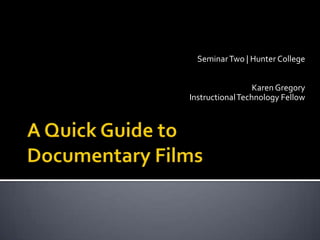
Hunter College Seminar Two
- 1. Seminar Two | Hunter College Karen Gregory Instructional Technology Fellow
- 2. What story do you want to tell? Why? What resources do you have? Research, photos, videos, access to interviews? What resources do you need? Equipment, access, more research?
- 3. Again, what story are you trying to tell? How would you write out this story? Storyboarding (template via Pages) How does the footage you have (or may be able to collect) inform the structure or vice versa?
- 4. Techniques for interviews: Develop questions in advance, revise questions Try out the questions on other people first Sound checks, video checks (is this thing on?) Consider the interview location (will there be wind? Children, cars, etc?) How much time do you need? Longer than you think. Building Trust. Your job is to make the personal feel comfortable. Camera &Mic are forms of power. Wield them wisely.
- 5. How can we tell a “truthful” story? What are the ethical concerns this question brings up? How does a camera/mic alter the dynamics between people?
- 6. Where will this doc “live”? Who will see it? Who do you want to see it? Can a documentary have a public impact?
- 7. Do some research to find other short docs and films? Can you model your work on them? Or borrow techniques? How did they make the doc? Camera set ups? Use of art? Use of music? Use of titles? See This American Life or The Moth (KG also bringing in examples)
- 8. When you think about structuring and editing the doc, where might art & music be used to tell the story? Consider here “Group Roles”– is someone in your group “the artist” or “composer”? Free Royalty Footage Creative Commons Search
- 9. When will you wander/collect B-Roll? When will you script/storyboard When will you interview? When will you review footage? When will you revise the storyboard? When will edit? Who & how? When will you revise the edits?
- 10. Roles to consider: Teams will structure the project Director Producer Co-creators Editor Music Supervisor/Composer Art Project Manager! The person who has everyone's information and the schedule is okay Cinematographer Sound recording Reporters/Interviewers Animation
- 11. Everything that shows up in the final film is a result of a choice. We will cover the basics of iMovie in class
- 12. TEST YOUR EQUIPMENT (even your iPhone) Sound issues (cars, wind, etc) Use a tripod Wander and take still photos as B-roll footage Establishing shots Signage Details that might be useful
- 13. What are you going to use (and why?) http://macaulay.cuny.edu/community/doit/av- equipment/ Be comfortable with your camera! Discuss with Karen or Pam what cameras to use or select.